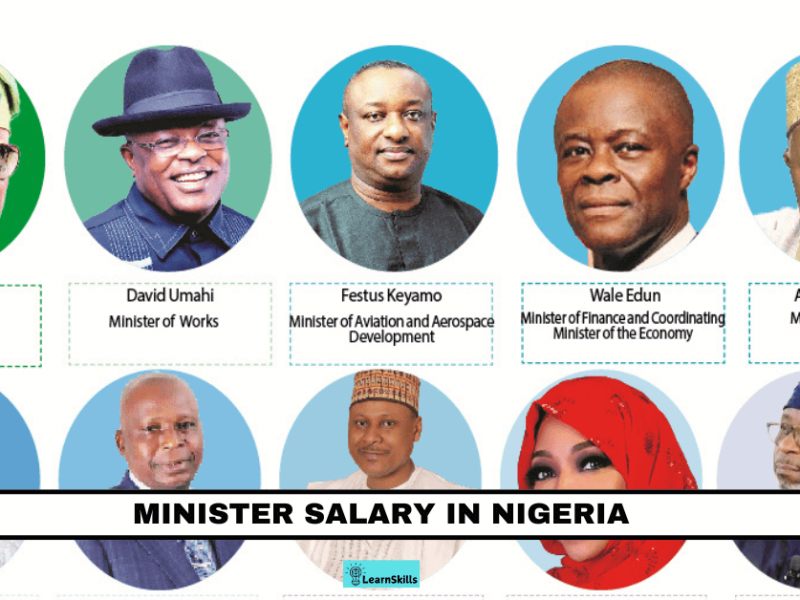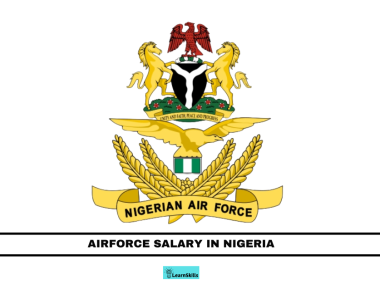In Nigeria, a minister’s salary reflects their role in the Federal Government, showcasing the balance between public service and compensation.
Ministers earn a monthly salary of ₦942,000 after tax deductions, amounting to ₦11,304,000 annually. This figure sets the stage for discussions about the worth of government positions and the financial expectations placed upon leaders.
Ministers’ earnings also include various allowances, leading to increased overall compensation. For instance, additional benefits such as personal assistants and fuel allowances can significantly boost their take-home pay.
Understanding these figures helps you grasp the financial landscape of Nigeria’s political leadership.
Structure of Political Office Holders’ Remuneration
This section outlines how remuneration for political office holders is structured in Nigeria. It will focus on the role of the Revenue Mobilization Allocation and Fiscal Commission (RMAFC) and the legal framework that governs salaries.
Revenue Mobilization Allocation and Fiscal Commission (RMAFC)
The RMAFC is responsible for determining the salaries and allowances for various political office holders, including ministers. This commission ensures that the pay structure is fair and based on federal revenue.
RMAFC conducts periodic reviews to adjust salaries in line with inflation and other economic factors. Political officeholders, including ministers, are expected to receive a competitive salary to maintain the integrity of their roles.
For 2025, here are some key salary figures for Nigerian ministers:
| Position | Monthly Salary (NGN) |
|---|---|
| Minister | 794,085 |
| Minister of State | 783,032 |
Legal Framework Governing Salaries
The political office holders’ salaries are legally defined by the Certain Political, Public, and Judicial Office Holders (Salaries and Allowances) Act, 2002. This law lays the foundation for how salaries are calculated and what allowances are included.
The act is essential for maintaining transparency and accountability. It ensures that the remuneration packages are public, allowing citizens to understand what their leaders earn.
Ministers and other officeholders must follow this legal framework to ensure compliance with the established pay structures. Regular updates and amendments help reflect changes in the economic environment and keep salaries competitive.
Breakdown of a Minister’s Remuneration
In Nigeria, a minister’s remuneration includes a monthly salary with various allowances. This section breaks down the key components of how ministers are compensated for their roles.
Monthly Salary and Regular Allowances
The monthly salary of a minister in Nigeria is about ₦168,866.66. This amount is after tax deductions, with some ministers reporting earnings close to ₦942,000 monthly when considering other factors.
In addition to the salary, ministers receive regular allowances. These can include:
- Furniture Allowance: A one-time payment to help with home office setup.
- Duty Tour Allowance: This covers expenses when ministers travel for official duties.
These allowances are designed to support ministers in performing their responsibilities effectively.
Additional Benefits and Allowances
Beyond the basic salary and regular allowances, ministers enjoy several additional benefits.
Some of these include:
- Newspaper Allowance: This helps cover costs for staying updated with current events.
- Vehicle Fueling Allowance: On average, this is about ₦1,519,800 annually, to support official travel.
These benefits can significantly boost a minister’s take-home compensation and help manage the costs associated with their official duties.
Comparison with Other Political Office Holders
Ministers have specific salaries, to other political officeholders like senators and the Secretary to the Government of the Federation. Understanding these differences can clarify the financial landscape of these roles.
Senators and Representatives
Senators in Nigeria earn different salaries compared to ministers. The annual basic salary for a senator is about ₦2,484,800, amounting to ₦207,066.67 per month. In contrast, ministers earn an annual salary of ₦2,026,400, or around ₦168,866.66 monthly.
While ministers manage specific government functions, senators are elected to represent their constituents and influence legislation.
Senators often have additional allowances related to office expenses, travel, and committee work, which can significantly increase their overall compensation.
Secretary to the Government of the Federation
The Secretary to the Government of the Federation (SGF) holds a crucial role in the Nigerian political system. The SGF receives an annual salary of approximately ₦3,514,705, or about ₦292,892.08 monthly.
This salary is higher than that of ministers and reflects the responsibilities of overseeing government operations.
The SGF coordinates between the executive branch and other governmental bodies, highlighting the critical support role within the Nigerian government structure.
Controversies and Public Perception
Many controversies surround the salaries of ministers in Nigeria. Public perception is often shaped by allegations of high pay, especially compared to average incomes. These issues raise questions about legality and public trust.
Allegations of Unconstitutional Remuneration
Concerns have been raised about the legality of minister salaries. Critics argue that these payments may be unconstitutional. For example, some believe that high salaries contradict the government’s commitment to fighting corruption and improving living standards.
Former officials like Shehu Sani have highlighted that some ministers could receive significant amounts monthly.
Reports indicate that salaries and allowances for federal ministers can exceed N30 million. This figure is seen as excessive, especially when many Nigerians struggle to make ends meet.
Security Concerns and Salary
There’s a link between high minister salaries and national security. With substantial financial benefits, some worry that officials may prioritize personal gain over public service. Security agents are often reminded of the need for transparency and accountability in public office.
Large salaries and allowances raise questions amid rising insecurity in the country. Taxpayers may feel their money should be allocated to essential services instead.
The debate continues as citizens call for a reconsideration of how political officeholders are compensated, weighing public safety against financial rewards.
Support Staff and Allowances
In the Nigerian government system, ministers rely on support staff to help them in their roles. Their salaries and allowances reflect the importance of their positions and the responsibilities they manage.
Personal Assistant and Special Assistants
Ministers often have one or more Personal Assistants (PAs) and Special Assistants (SAs). These roles are crucial for managing day-to-day tasks, scheduling, and communication.
Personal Assistant (PA): An essential aide who handles administrative duties. The PA helps organize meetings and manage correspondence.
Special Assistants (SAs): These individuals focus on specific areas, such as policy advising or public relations.
The salary for a Special Assistant can vary widely based on experience and role, but they usually receive competitive allowances. Ministers often allocate funds for vehicle fueling, maintenance, and other necessary costs to support their staff.










